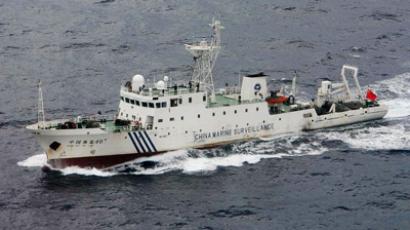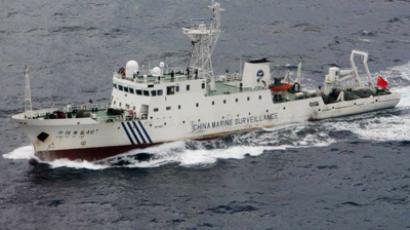'No to Beijing terrorists': Japanese stage anti-China march over islands reference (VIDEO)
Hundreds of Japanese nationalists have marched through the streets of Tokyo in protest against Chinese foreign policy, as the diplomatic row between the two countries over an archipelago in the East China Sea threatens to spiral out of control.
Marshaled by Ganbare Nippon, a right-wing advocacy group famous for its attention-catching public actions, a group of at least 800 people, carried placards reading “Sink the Chinese boats in our waters” and “Do not give in to the Beijing terrorists” as they walked through the central shopping district, before arriving at the Chinese Embassy.“Come on out of there!” shouted some of the protesters, as police had to restrain them. The building was forced to close due to the action.The demonstration was a response to the mass anti-Japanese rallies held in Chinese cities around the country, which led to the attack of several Japanese-owned stores, and led Japan’s Prime Minister, Yoshihiko Noda, to call for his counterpart to secure the safety of his countrymen in China.The cause of the dispute is a stretch of tiny uninhibited islands between the two countries, known as Senkaku in Japan and Diaoyu in China that have been the subject of an intermittent diplomatic dispute since 1971 and an ever-intensifying diplomatic spat for the past year.Controlled by the Japanese since 1895, the islands provide rich fishing grounds and possible mineral resources, as well as drawing an economic and political border between Japan and China.China, which says it has a claim to the islands dating back to ancient history, has repeatedly sent ships to their vicinity in a show of strength and its citizens have previously tried to land there to hold protests (with counter-protest landings made by nationalist Japanese).
The latest chain of events was set off when the Japanese government purchased the islands off a private family ten days ago – under threat that the owner was going to sell them to the staunchly anti-Chinese governor of Tokyo.China immediately sent several patrol and fishing ships to the area, with Japan also bolstering their naval presence.Meanwhile, the Japanese embassy in Beijing suspended its services following intense protests outside, while Japanese businesses shut their front doors after several attacks and arson incidents. Some Japanese contractors said Chinese partners had cancelled their orders. Workers at several Japanese-owned factories also went on strike. The combined losses from these incidents, has been estimated to exceed $100 million already.In a series of symbolic gestures, Chinese booksellers stopped stocking Japanese literature, while the Japanese national air carrier JAL severely cut the number of flights to China.Japanese armed forces and US marines also performed a joint drill in which they “re-captured” a “Japanese” island that had been “invaded”. The exercises were labeled “provocative” by Beijing, and in response the Chinese have staged a live-ammunition drill of their own. In recent days, protests have simmered down in China and officials there say they will protect Japanese businesses on its territory. The economic transactions between the two countries amounted to $349 billion last year. Nonetheless, the conflict looks nowhere near a definitive resolution, with Beijing calling for Japan to “repent its mistakes” and return the islands, and Prime Minister Noda insisting that Japan possesses an “unwavering resolve to defend its territorial lands and waters.”














